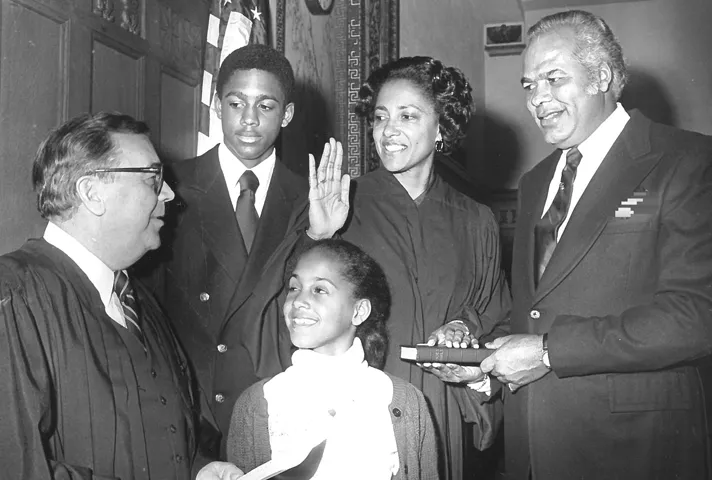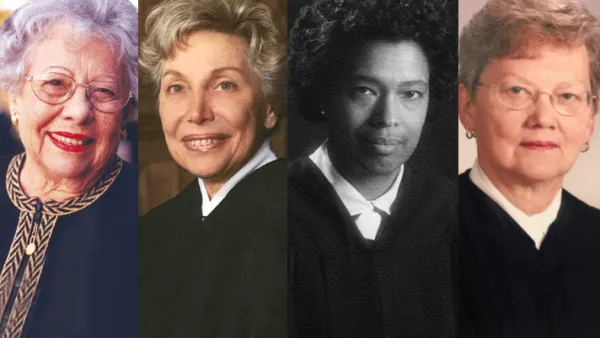
In 1979, with her family at her side, Judge Anne E. Thompson is sworn in as a federal judge in the District of New Jersey. Photo courtesy of Judge Thompson.
Judge Anne Elise Thompson never had specific career goals, and never imagined she would be part of a historic class of women judges appointed to the federal bench in 1979. A theater arts teacher in her early years after college, she entered law school, and then thrived in one professional challenge after another—succeeding as a public defender, prosecutor, and judge.
“I didn’t have any ambitions at any point. For me it was, does this sound like something I would want to do,” said Thompson, of the District of New Jersey. “I loved every job I had.”
She received inspiration from both her African American parents, who had successful professional careers despite attending segregated schools. Thompson’s father earned a dental degree, but still had to work several years as a railroad baggage handler until he could afford to buy the equipment to set up his dental practice in Philadelphia. Thompson’s mother became a teacher.
“My parents were from the South, and for them, education was very important,” Thompson said. “I had wonderful encouragement and support all through my young life.”
After a few years of teaching theater, Thompson enrolled in Howard University Law School. She worked for the U.S. Department of Labor, then moved to Trenton and married her husband, Bill, who also was a dentist. There, her legal career quickly advanced.
In Trenton, Thompson became a state public defender in 1967, and a municipal prosecutor in 1970. That led to a part-time municipal judgeship in 1972. “The mayor was an idealistic person,” Thompson said. “I had been active in the War on Poverty. He had the idea that the municipal court should have judges who were connected with the poverty population.”
In 1975, Gov. Brendan Byrne named Thompson Mercer County prosecutor. According to a 1979 New York Times profile, she was the first African American woman in America to hold such a post. “It was a job that I loved. The challenges were so great,” Thompson said.
When new federal judgeships opened in New Jersey, Thompson was appointed to a judicial nominating commission evaluating other candidates. Her fellow commission members recommended Thompson to the New Jersey U.S. senators.
Read the Series
This is the fourth in a series of articles about 23 women judges who in 1979 reshaped the federal Judiciary.
Despite her varied resume, she had infrequently been inside a federal courthouse, which felt isolated and austere compared to the buzz of a prosecutor’s office. “It was a huge change in atmosphere and environment,” she said.
Throughout her career, Thompson’s husband was a staunch ally. “He was a wonderful person, he was kind and loving and supportive in every way,” she said. “He was always anxious for me to take the next job. I think I might have said no to some of these posts if he hadn’t been there to say, ‘Oh, that’s wonderful.’ ”
Throughout her career, Thompson made friends, and kept them. Fellow judge Dickinson Debevoise remained a close colleague until his death. She still dines with several county prosecutors she served with in the 1970s. The former theater student befriended Kitty Carlisle, a onetime Broadway idol.
In the courtroom, she enthusiastically continues to hear cases. “It’s been a marvelous, magnificent job,” Thompson said. “It becomes more interesting as time goes by.”
1979: The Year Women Changed the Judiciary
The number of women serving as federal judges more than doubled in 1979. In this series, learn more about the trailblazers who reshaped the Judiciary.
Subscribe to News Updates
Subscribe to be notified when the news section is updated.

